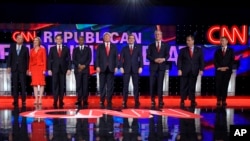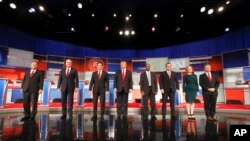Nine presidential contenders are taking part Tuesday in the fifth Republican presidential debate, which is expected to be dominated by national security and terrorism issues.
The debate in Las Vegas, Nevada takes place with only less than two months before the Iowa caucuses, the crucial, first nominating event of the primary election season.
Earlier, a pre-debate featured four other candidates - former Pennsylvania senator Rick Santorum, former Arkansas governor Mike Huckabee, South Carolina Senator Lindsey Graham and former New York governor George Pataki - who did not qualify for the main event,
In the first set of questions at the undercard debate, the subject was a proposal from a candidate who was not yet on stage: front-runner Donald Trump and his call to temporarily bar Muslims from traveling to the U.S.
Graham rejected the idea, apologizing to allied Muslim leaders in Jordan, Egypt and elsewhere. "I am sorry. He does not represent us," Graham said.
Trump's campaign initially said his ban on Muslims entering the U.S. would apply to everybody, but he later said it would not apply to leaders from Muslim nations.
Pataki lashed out at Trump and Democratic front-runner Hillary Clinton. He said, "Neither is fit to be president of the United States."
This latest face-off comes amid public concerns about terrorism and national security, and new poll numbers that buttress the campaigns of real estate mogul Donald Trump and Texas Senator Ted Cruz.
Trump continues to lead in national polls, but Cruz is surging in Iowa, the state that begins the presidential candidate selection process with its caucus voting on February 1.
The poll results suggested that concern about terrorism in the wake of the December 2 attack in San Bernardino, California, was having an impact on voters.
“The last time Quinnipiac University polled, the economy was the top issue. Now it is terrorism, a subject on which Donald Trump gets the highest rating of any of the candidates,” said Quinnipiac assistant polling director Peter Brown. He added that Cruz “appears to be the main beneficiary of Dr. [Ben] Carson’s apparent collapse.”
Cruz in Iowa
A new Quinnipiac University poll of likely Iowa Republican caucus participants indicated a close race between Trump at 28 percent and Cruz with 27 percent. U.S. Senator Marco Rubio of Florida was third with 14 percent, and Carson, a retired neurosurgeon who led the last poll in October, was fourth with 10 percent. No one else was above 5 percent.
The Quinnipiac poll came on the heels of the latest Des Moines Register/Bloomberg Politics poll, which also had Cruz in first place in Iowa.
Watch video report from VOA's Zlatica Hoke:
Cruz’s long-term strategy of trying to appeal to a range of conservative voters may be paying off as he draws support from tea party activists, foreign policy hawks and evangelical Christian voters who make up a key core constituency among Iowa Republican caucus voters.
Trump/Cruz battle?
Trump remains in the top spot nationally among Republican voters, according to the latest Wall Street Journal/NBC News poll. Trump was at 27 percent in the survey, followed by Cruz with 22 percent, Rubio in third with 15 percent and Carson in fourth place with 11 percent.
The Cruz surge in Iowa caught Trump’s attention, and he’s become more aggressive in his critique of the freshman Texas senator.







